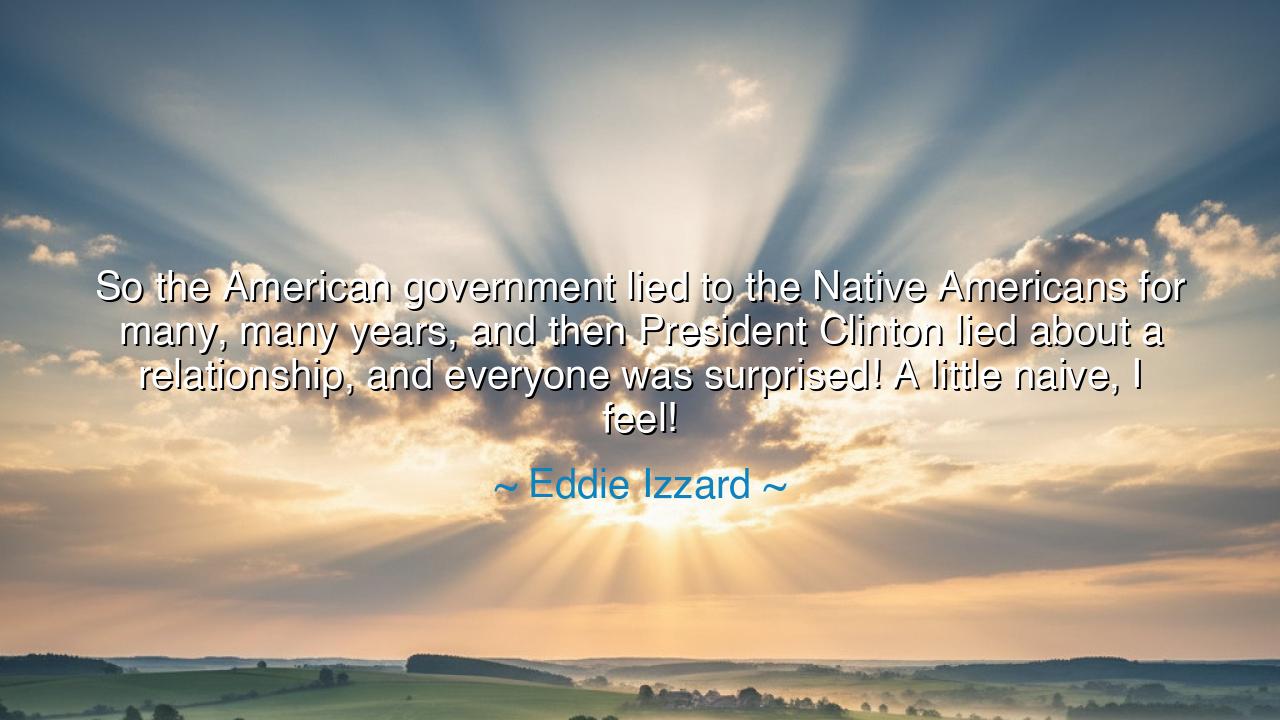
So the American government lied to the Native Americans for
So the American government lied to the Native Americans for many, many years, and then President Clinton lied about a relationship, and everyone was surprised! A little naive, I feel!






Hear now the words of Eddie Izzard, who spake with sharp wit and hidden sorrow: “So the American government lied to the Native Americans for many, many years, and then President Clinton lied about a relationship, and everyone was surprised! A little naive, I feel!” Beneath the cloak of jest lies a truth both bitter and enduring—that the path of rulers is often marked by deception, and that memory is short when weighed against the comforts of the present.
When he speaks of Native Americans, he summons the long tragedy of broken promises and treaties made in smoke yet dissolved in silence. For centuries, their lands were taken, their voices silenced, their dignity stripped by the very hands that swore to honor them. Such a history is a wound upon the soil, a scar written in the blood of nations. It is here that Izzard plants the root of his comparison, reminding us that betrayal was no stranger to the American story.
And then, with irony both playful and piercing, he turns to President Clinton and his falsehood about a mere relationship. The world, he notes, reeled in shock, as if a lie of the heart was unthinkable, as if deceit had never before been uttered by men in power. How strange, he muses, that a people accustomed to centuries of broken covenants could act as though the new lie was unprecedented. Thus he names this reaction naive, a blindness born of selective memory.
In these words lies more than satire—it is a call to wisdom. For Izzard shows that outrage without context is folly, and that the wise must remember the whole tapestry of history. To marvel at a single thread of falsehood while ignoring the loom of centuries is to see with clouded vision. Truth demands we acknowledge both the great betrayals of nations and the small deceits of men, for they are woven from the same cloth.
Therefore, let future generations learn: deception is no new visitor to the courts of power. To be surprised by it is to forget the lessons carved into stone and bone. Better it is to keep eyes wide open, hearts tempered by history, and spirits ready to discern falsehood wherever it takes root. For only then may the people walk with wisdom, and no longer with the naivety of those who forget.






YYYun Yun
Izzard’s comment about the American government’s history with Native Americans and Clinton’s personal scandal is a stark reminder that dishonesty is not just a modern issue, but a historical one. Are we still that naive as a society, expecting our leaders to be truthful? How do we balance our desire for trust in government with the reality that those in power often have their own agendas? Is it possible to push for a more honest political system?
HNvo bui huu nhan
This quote is a sharp commentary on how history and human behavior repeat themselves. The idea that people were surprised by Clinton's scandal despite the long history of governmental dishonesty is a reminder that we often overlook the flaws of our leaders. But why do we keep falling for it? Is it because we trust too easily, or because we want to believe in the system, even when it consistently fails us?
T124- Le Thanh Tam 12a3
Izzard’s sarcasm is spot on—he’s calling out a major flaw in how we view politics and leadership. The expectation of honesty from politicians is unrealistic when we’ve seen time and time again how power can corrupt. But is this a reason to give up on holding politicians accountable? Or should we accept that some level of deception is part of politics? Can we ever expect transparency from the people we elect to lead us?
VLHoang Van Linh
The way Izzard ties together historical lies and personal scandals is eye-opening. It’s like he’s making a point that we often choose to ignore uncomfortable truths, only to be shocked when those same truths surface later. The question I have is: how much of this is part of human nature? Do we all want to believe in the goodness of others, or is it just easier to ignore past wrongdoings until they catch up with us?
THPhan Nguyen thien hong
Izzard’s words are biting and cynical, but there’s truth in them. Why is it that we seem so surprised by dishonesty from those in power? It seems like we expect leaders to be perfect and trustworthy, despite history showing us otherwise. What does this say about our relationship with power and politics? Are we setting ourselves up for disappointment by continuing to idealize political figures? Should we be more skeptical?